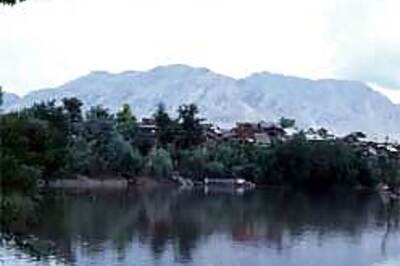
views
New Delhi: Inside an old, decrepit building in Noida’s Sector-1, a small group of scientists and engineers is hard at work. As the day unfolds, they oscillate between piles of paperwork and field inspections.
These are all employees of the Uttar Pradesh Pollution Control Board (UPPCB). Among them is regional officer Dr Anil Kumar Singh. “There are just a few people here, three to four people including me, who do this,” he said. “We have so much work in terms of ensuring that the guidelines are followed. We have to monitor the industries and also monitor water bodies regularly.”
Singh and the others are hustling for a reason. As Delhi and adjoining areas reel under another spell of toxic air, the Graded Response Action Plan (GRAP) – the Central Pollution Control Board (CPCB)’s standardised mechanism to combat pollution – is in its 29th day of implementation across the National Capital Region (NCR).
GRAP, which was established in 2016, is a list of directives that has to be implemented by pollution-control authorities when the air quality deteriorates to the ‘severe plus’ emergency category. Beyond levels of 300 on the Air Quality Index (AQI), the use of diesel generators is banned, construction activities stopped and extensive restrictions placed on industries. And it is incumbent on officers of the pollution control boards to ensure that the guidelines are followed.
In Noida, where four officers have been assigned the responsibility to implement GRAP, just 122 industries and contractors were penalised between October 3 and November 5. During this period, the city (which is said to comprise 6,014 manufacturing units) saw AQI levels touching the ‘severe-plus’ emergency category.
When asked if the issue had been raised within the UPPCB, Singh, however, remained reticent. “This is a very internal issue and we have had discussions,” he said.
However, a look at other parts within NCR, particularly Gurugram and Manesar, indicated that the problem was widespread. “There are a total of seven officers in both Gurugram and Manesar,” an official of the Haryana State Pollution Control Board (HSPCB) told News18.
The Comprehensive Environmental Pollution Index (CEPI) in 2018 listed Gurugram among the top 10 most polluted industrial areas or clusters along with regions like the Najafgarh drain basin in Delhi and Uttar Pradesh’s Varanasi. According to the HSPCB officer, at least 12 employees are required for the effective implementation of GRAP in Gurugram alone.
In fact, a plan recommending the strengthening of the workforce was recently approved by the Haryana government. The HPCB official, however, revealed that the proposal had been stuck for nearly two years, since around the time Delhi was hit by the ‘Great Smog’ in November 2017.
“This has been going on for two years now. The matter was with the (public enterprises) bureau and did not escalate from there,” he said.
According to HSPCB’s member secretary S Narayanan, the proposal will now take anywhere between two to three months to be implemented. “This issue has been there for a long time. But the final consolidation of the proposal happened five to six months back,” he said. “Our accounts committee had also been recommending this because for a state like Haryana which has so many industries, we are very poorly staffed. We have a total of 150-170 people in all cadres. That is not enough.”
In September, the HSPCB was also pulled up by the National Green Tribunal (NGT) over the issue of industrial pollution and was directed to bring in stricter regulations to tackle the expansion of industrial areas and construction activities.
Since the implementation of GRAP this year, penalties have amounted to nearly Rs 2.3 crore in Gurugram and Manesar. However, only two challans were issued for flouting the ban on diesel generators, though the actual number of violations is likely much higher given the city’s extensive dependence on these machines, observers say.
Narayanan was, however, hopeful that with the proposal for more recruits approved, the HSPCB will finally be able to implement rules more rigorously. “Further, we have also started to monitor everything electronically, which will reduce our burden,” he said. “So our fieldwork will mainly focus on checking up on cases and legal enforcement in the coming days.”

















Comments
0 comment